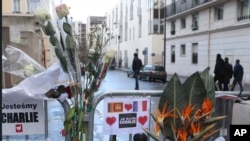A literary organization's award for courage to the French satirical magazine Charlie Hebdo has split the usually harmonious and left-leaning U.S. literary elite, with some of the country's best-known writers exchanging accusations of cowardice and blindness to racism.
Best known for its cartoons that bluntly, sometimes lewdly mock organized religions and political figures, Charlie Hebdo was targeted in January by two Islamist gunmen who forced their way into the magazine's Paris offices and opened fire. Twelve people were killed and 11 others were wounded. Four years earlier, in 2011, Charlie Hebdo was firebombed after publishing an issue with a cartoon of the Prophet Muhammad on the cover with the caption "100 lashes of the whip if you don't die laughing."
Scathing, blasphemous, even obscene satire is bedrock in French political and literary culture, dating at least to Voltaire's savaging of Catholicism in the 18th century. But after the attacks, some American writers expressed discomfort with Charlie Hebdo's caricatures, suggesting that some were culturally insensitive or even racist.
And days after the American chapter of PEN said it would give the first PEN/Toni and James C. Goodale Freedom of Expression Courage Award to Charlie Hebdo at its annual fundraising dinner in New York, six prominent members wrote a letter of protest, saying they were withdrawing from the event.
No "reward" for some expressions
The letter, by writers Francine Prose, Peter Carey, Michael Ondaatje, Teju Cole, Rachel Kushner and Taiye Selasi, called the killings "sickening and tragic" and said no expression of views, "however disagreeable," should be met with violence. But it said that some expressions should not be "enthusiastically rewarded." Describing France's Muslim population as "marginalized, embattled and victimized," the writers asserted that "Charlie Hebdo's cartoons of the Prophet must be seen as being intended to cause further humiliation and suffering."
"PEN is not simply conveying support for freedom of expression, but also valorizing selectively offensive material: material that intensifies the anti-Islamic, anti-Maghreb, anti-Arab sentiments already prevalent in the Western world," the writers said.
More than 200 other PEN members have since added their names to the protest, even as others, including Salman Rushdie, rose to defend the award and attack the critics.
Rushdie, who lived in hiding for years because of Islamist death threats for his novel The Satanic Verses, told The Associated Press, "This issue has nothing to do with an oppressed and disadvantaged minority. It has everything to do with the battle against fanatical Islam, which is highly organized, well-funded and which seeks to terrify us all, Muslims as well as non-Muslims, into a cowed silence."
In New York to receive the award for Charlie Hebdo, editor-in-chief Gerard Biard and film critic Jean-Baptiste Thoret spoke at a PEN panel about the controversy. The magazine's critics also were invited to participate but declined.
Biard said the magazine had fought since its founding in the 1960s "against all discriminations against minorities, discrimination against women, against gay people, against weak people, poor people. And we are always fighting the right wing and the extreme right wing, even more than Catholics or [other] religions," he said. "We have nothing against religion. We fight against political use of religions."
Goal: Make people think harder
Thoret said of the cartoons, "If you make the effort to understand what the cartoon is about, you won't be offended. It's more than a question of pushing the limit, or [of trying] to be provocative. It's to make [people] think harder, to be a little more intelligent after a cartoon than before."
Only a small minority of Charlie Hebdo's cover cartoons have caricatured Muslim figures. Many more have graphically satirized Catholic and Jewish leaders and political figures. Cartoons that depicted the Prophet, the editors said, were not anti-Islam, but were rather meant to mock extremist, violent factions, for example, a cartoon showing the Prophet himself about to be beheaded by a jihadi. The caption for that cartoon reads "If Muhammad came back."
Suzanne Nossel, executive director of PEN American Center, also defended the award at the panel. "Courage was really the word that came to mind, their courage in going on after the firebombing in 2011, and then earlier this year, after the attack on their staff," she said.
She added that, although the award is not a literary award or an artistic judgment, "what we have concluded — we really are quite firm — is that these do not constitute hate speech, that if you understand them in context, it's quite clear they're satirical. They target figures of power, icons of power in many different guises."




